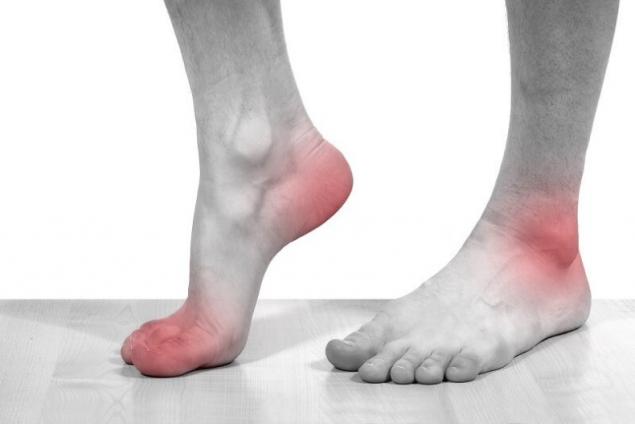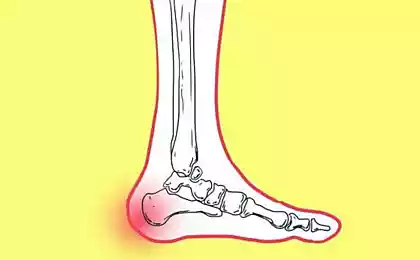551
The major triggers of gout
You can sometimes hear the claim that low-carb diets high in meat consumption cause gout. This is not true (like what a low-carb diet should lead to high consumption of meat).
Nevertheless, it may be a temporary increase in the risk of gout in the first six weeks of strict low-carb diet. After this initial period, the effect of a low-carb diet in relation to gout is neutral or even protective.
Read on to learn more about what is gout and how to avoid it.
What is goutGout is a sudden and painful inflammation of the joint, most often at the base of the thumb. It can affect other joints, for example, in the heels, knees, wrists and fingers.

The cause of gout is increased uric acid in the blood, which leads to the deposition of crystals in the affected joints.
Gout is more common among people who are overweight and have metabolic syndrome, and it has become more popular in recent decades. Disease suffer 6% of men and 2% of women (among older it is even more common).
Historically, gout was called the "disease of kings" and "rich man's disease", but nowadays everyone can afford... sugar.
Meat and gout
In gout often accused of excessive meat consumption. This is because the uric acid that causes gout is the breakdown product of purines, the building blocks of proteins and meat a high concentration.
However, if there is less meat, changing the risk of gout will be very small and even vegetarians more likely to develop gout than one would assume if it was that.
If there are more proteins (e.g., meat), then it seems to be leading to increased output of uric acid from the kidney together with urine and it doesn't affect the level of uric acid in the blood... and the risk of gout.
Sugar and gout
There is a very strong link between gout, obesity, type 2 diabetes and metabolic syndrome, so it is possible that the main reason of this one: sugar and other refined carbohydrates.

In fact, it has been demonstrated that elevated levels of insulin in the blood is a consequence of a diet rich in refined carbohydrates increase uric acid levels, probably due to the fact that decreases its output by the kidneys.
There is an amazing story of how the incidence of gout suddenly became to grow among the population, as the consumption of sugar start to rise rapidly (for example, in Britain in the eighteenth century, in parallel with the birth of the sugar industry in the country).
There is also experimental evidence that fructose (one of the main components of sugar) dramatically increases the level of uric acid in the body.
Alcohol and fructose are metabolized in the body in a similar manner, alcohol increases the uric acid level exactly the same as fructose.
Low-carb diet, uric acid and gout
Short-term studies have shown a temporary increase in uric acid level at the start strict low-carb (i.e. ketogenic) diet. This effect disappears after approximately six weeks and the uric acid level returns to the original value or even lower.
Studies have not shown significant changes of uric acid level while following a low-carb diet for several months or years.
After dozens of high-quality studies that compare low carb diets with other diets, there are no data showing an increased risk of gout, although no research has focused on this aspect.
The doctor is regularly treating patients on low-carb diets, did not observe the increase of gout, even in the initial period. So, if there is increased risk during the first few weeks, it is a small or medium.
Long-term uric acid levels when following a low carbohydrate diet is usually reduced, as is the case with other markers of the metabolic syndrome, and even patients suffering from gout have a chance to get rid of it.
How to avoid gout
Eat less sugar.Drink less alcohol. Especially, you should avoid beer and other alcoholic beverages high carbohydrate. Get rid of excess weight and metabolic syndrome. Low-carb diet is a good way to do it, like interval fasting.
As a bonus, these changes in lifestyle can bring many other positive effects for weight and health.
Meat — to eat or not?
The rejection of meat is not binding or effective way to reduce the risk of gout.
In addition, note that the low-carb diet should not contain much protein or meat. Effective low-carb diet should contain moderate amount of proteins and a large number of natural fats.
Combined well the low-carb diet is likely to reduce long-term risks of gout.published
The materials are for informational purposes. Remember, self-life-threatening, for advice regarding the use of any medicines and methods of treatment, contact your doctor.
P. S. And remember, only by changing their consumption — together we change the world! ©
Source: //lchf.ru/15137
Nevertheless, it may be a temporary increase in the risk of gout in the first six weeks of strict low-carb diet. After this initial period, the effect of a low-carb diet in relation to gout is neutral or even protective.
Read on to learn more about what is gout and how to avoid it.
What is goutGout is a sudden and painful inflammation of the joint, most often at the base of the thumb. It can affect other joints, for example, in the heels, knees, wrists and fingers.

The cause of gout is increased uric acid in the blood, which leads to the deposition of crystals in the affected joints.
Gout is more common among people who are overweight and have metabolic syndrome, and it has become more popular in recent decades. Disease suffer 6% of men and 2% of women (among older it is even more common).
Historically, gout was called the "disease of kings" and "rich man's disease", but nowadays everyone can afford... sugar.
Meat and gout
In gout often accused of excessive meat consumption. This is because the uric acid that causes gout is the breakdown product of purines, the building blocks of proteins and meat a high concentration.
However, if there is less meat, changing the risk of gout will be very small and even vegetarians more likely to develop gout than one would assume if it was that.
If there are more proteins (e.g., meat), then it seems to be leading to increased output of uric acid from the kidney together with urine and it doesn't affect the level of uric acid in the blood... and the risk of gout.
Sugar and gout
There is a very strong link between gout, obesity, type 2 diabetes and metabolic syndrome, so it is possible that the main reason of this one: sugar and other refined carbohydrates.

In fact, it has been demonstrated that elevated levels of insulin in the blood is a consequence of a diet rich in refined carbohydrates increase uric acid levels, probably due to the fact that decreases its output by the kidneys.
There is an amazing story of how the incidence of gout suddenly became to grow among the population, as the consumption of sugar start to rise rapidly (for example, in Britain in the eighteenth century, in parallel with the birth of the sugar industry in the country).
There is also experimental evidence that fructose (one of the main components of sugar) dramatically increases the level of uric acid in the body.
Alcohol and fructose are metabolized in the body in a similar manner, alcohol increases the uric acid level exactly the same as fructose.
Low-carb diet, uric acid and gout
Short-term studies have shown a temporary increase in uric acid level at the start strict low-carb (i.e. ketogenic) diet. This effect disappears after approximately six weeks and the uric acid level returns to the original value or even lower.
Studies have not shown significant changes of uric acid level while following a low-carb diet for several months or years.
After dozens of high-quality studies that compare low carb diets with other diets, there are no data showing an increased risk of gout, although no research has focused on this aspect.
The doctor is regularly treating patients on low-carb diets, did not observe the increase of gout, even in the initial period. So, if there is increased risk during the first few weeks, it is a small or medium.
Long-term uric acid levels when following a low carbohydrate diet is usually reduced, as is the case with other markers of the metabolic syndrome, and even patients suffering from gout have a chance to get rid of it.
How to avoid gout
Eat less sugar.Drink less alcohol. Especially, you should avoid beer and other alcoholic beverages high carbohydrate. Get rid of excess weight and metabolic syndrome. Low-carb diet is a good way to do it, like interval fasting.
As a bonus, these changes in lifestyle can bring many other positive effects for weight and health.
Meat — to eat or not?
The rejection of meat is not binding or effective way to reduce the risk of gout.
In addition, note that the low-carb diet should not contain much protein or meat. Effective low-carb diet should contain moderate amount of proteins and a large number of natural fats.
Combined well the low-carb diet is likely to reduce long-term risks of gout.published
The materials are for informational purposes. Remember, self-life-threatening, for advice regarding the use of any medicines and methods of treatment, contact your doctor.
P. S. And remember, only by changing their consumption — together we change the world! ©
Source: //lchf.ru/15137
H. H. Reckeweg: 6 PHASES of emergence of any disease
John Eldridge: the Most important question for men























